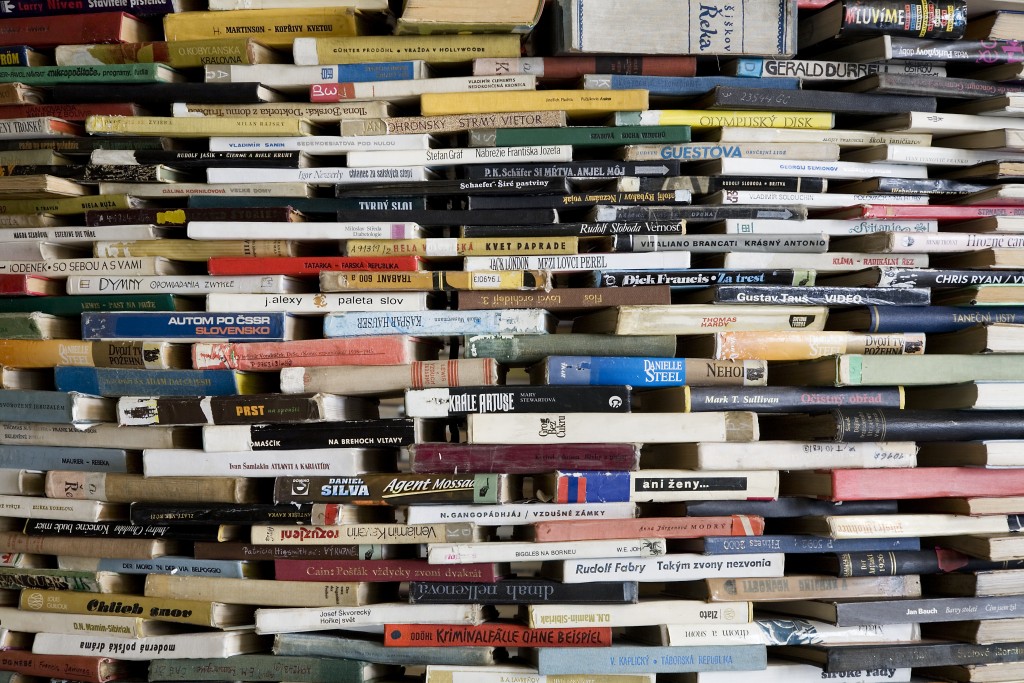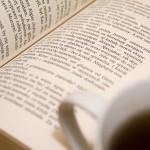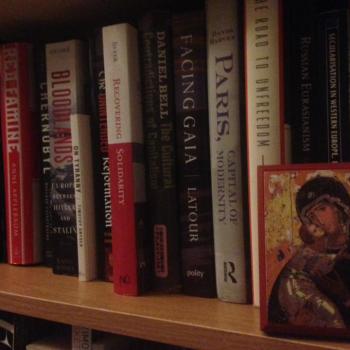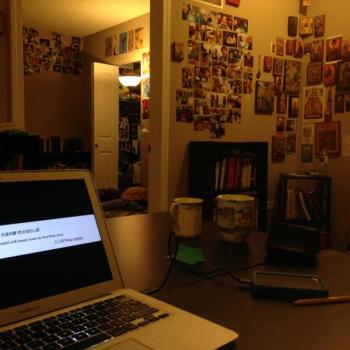
PART 1: ‘Sure, I’ll write about growing up conservative’
PART 2: ‘I thought “conservative” just meant “solid” and “dependable”‘
PART 3: ‘Catholic school contorted my “conservatism” because we had to read closely’
Although I will be teaching a course on ‘Comparative Minority Conservatisms’ at Northwestern University in the fall quarter, my posts here will unfortunately not be able to cover the intellectual depth and breadth of the ‘conservative tradition.’ This is a personal reflection and can only take into account the influences that actually were influential as I was growing up. Any more than that, and I will have to send this all out to a peer-reviewed journal, which would be a shame, because I am sure it would be rejected.
I guess if I’m telling you that we read some texts closely in high school and that this reading had something to do with me rejecting the ideology of the Right, it probably is a point of common courtesy to show you what I remember reading in high school. As I mentioned in my last post, what you will see here has very little to do with a ‘conservative’ canon. I am sure that this will be very disappointing and that some will think that I rejected an ideology that I knew nothing about. This is a fair point, but I hope that my last post will also have laid the groundwork for why I am increasingly sympathetic toward critical theorist Slavoj Žižek’s rejection of ideology altogether.
I do not post this list to show off. For example, it is true that I took honors and AP classes in high school; pretending otherwise would be a lie, and as the conservative fiction about George Washington and the cherry tree goes, ‘I cannot tell a lie.’ Hopefully, it will demonstrate that, as Qoholet teaches in the biblical wisdom book Ecclesiastes, ‘of the making of many books there is no end, and much study wearies the body.’ By all means, please do not go out and read all the stuff on this list unless you absolutely want to. It’s just a list of what I ended up reading, some of it better than others.
So here goes – a record of what I remember reading, which means that there will be much that I have unfortunately forgotten:
FRESHMAN HONORS ENGLISH, or the class where Mr Krantz calls you on your bullshit every time
Summer Reading: Tony Hillerman, People of Darkness
Ray Bradbury, ‘I See You Never’
Robert Farrar Capon, ‘The First Session,’ in Supper of the Lamb
Sophocles, Oedipus Rex (favourite character: Tiresias)
James Joyce, Dubliners (Miss Ivors from ‘The Dead’ taunts me to this day)
Documentary: The Ad and the Ego
Juan Rulfo, Pedro Páramo (traumatized the whole class; appreciate it much more now)
Shakespeare, Romeo and Juliet
WORLD HISTORY
Elie Wiesel, Night
[We had a textbook, but I don’t remember what it was, but we had a brilliant teacher Ms Sohi who did her MA and went on to do a PhD in postcolonial history. Also, I did my final project on the Nuremberg Trials and learned a little bit about Nazi ideology and international law, although the best part was seeing pictures of them all hang. Oh yeah, and we saw the film Gandhi.]
FRESHMAN THEOLOGY
The Bible (OK, fine, mostly the first five books! NRSV, if you want to know! Oxford Annotated! I’m still using it!)
And some movies: Powder, A Christmas Story
Oh yeah, and we had sex ed, so we memorized all the STIs and their symptoms. Seriously. In addition to the sacraments. But the best part was that ‘Papa Bear’ Shelley taught us what ‘hermeneutics’ were; in fact, our first assignment was to go home and say to our parents at dinner, ‘Mom, Dad, I am a hermeneutician.’ Papa Bear also was the first to put me onto Rahner. He also taught us that ‘midrash’ is not a rash and that aggiornamento is an important Italian word to know.
SOPHOMORE HONORS ENGLISH
Summer Reading: Fae Myenne Ng, Bone
Beowulf (trans. Seamus Heaney)
Sir Gawain and the Green Knight
Chaucer, Canterbury Tales (esp. ‘Prologue’ – in both Middle and modern English – and then I got put in a group to dramatize ‘The Pardoner’s Tale,’ which is the only thing I therefore remember because I stole my dad’s clerical collar for the show)
Shakespeare, The Merchant of Venice
Dickens, Hard Times
But the most important part of this class was that at the end, Ms Hicks told me, ‘It was fun.’ It had not occurred to me that this class was fun. But as I thought about it, it was pretty fun.
CHRISTOLOGY
The Gospel of Mark [we had a textbook too, and we saw some documentary with John Dominic Crossan. Oh, and we saw Romero.].
But the craziest part was that as we were leaving the last class, Mr McCarty asked me: ‘Which of Paul’s letters do you like the most?’ We had not read any of Paul’s letters in this class. I said: ‘Romans.’ He said: ‘I thought so.’ Oh, and the other thing was – one time I asked him a hard question, and he wrote the word, ‘PATRISTICS,’ on the board and said, ‘I don’t know much about patristics, so I can’t answer your question.’
MORAL THEOLOGY
We had a textbook for this class, but what made the most impression on me was the film Dead Man Walking. Ms Armstrong also called me a ‘theologian,’ but on deep hindsight, this is because she takes the Pedagogy of the Oppressed to a level of unparalleled perfection. Someday I will teach like her.
CIVIL WAR
Jeff Shaara, Gods and Generals [I think we were also supposed to read his dad Michael’s Killer Angels, and maybe I read some of it; I definitely never got around to The Last Full Measure. I remember doing my final project on some ship and double agent, but I can’t remember what it was.]
JUNIOR HONORS ENGLISH
Summer Reading: Ursula LeGuin, A Wizard of Earthsea
Twain, Adventures of Huckleberry Finn
Steinbeck, Grapes of Wrath
Steinbeck, Of Mice and Men [watched this on film]
Tennessee Williams, The Glass Menagerie
Tennessee Williams, Cat on a Hot Tin Roof [we also saw Suddenly, Last Summer in a theatre and A Streetcar Named Desire on film]
Eugene O’Neill, Beyond the Horizon [watched this on film, I think]
Arthur Miller, Death of a Salesman
Ms Weltchek also made us make a movie on a period of drama. Our group did one on Shakespeare. My British accent is terrible. All of the British accents. I can’t do any of them.
TWENTIETH CENTURY LITERATURE
Thomas Mann, ‘Death in Venice‘
Nadine Gordimer, one of her short stories (can’t remember which, but it was about apartheid)
Isak Dinesen, something from Winter’s Tales (can’t remember which one)
Dorothy Parker, ‘A Telephone Call‘
Carson McCullers, Ballad of the Sad Cafe
Flannery O’Connor, ‘A Good Man Is Hard to Find’
Alain Locke, The New Negro
James Baldwin, The Fire Next Time (I credit this book for my entire career trajectory. Thanks, Ms Weltchek, for making me read it – and more importantly, forcing me to digest it.)
Salman Rushdie, Haroun and the Sea of Stories [also watched this in theatre after reading]
Camus, The Stranger
Wilde, The Importance of Being Earnest (film only)
Hemingway, In Our Time (selections) and The Sun Also Rises
For some reason, I ended up reading James Joyce’s ‘Grace‘ too. I credit my having read this story with my later having become Eastern Catholic.
WORLD LITERATURE
Camus, The Stranger (again)
Naguib Mahfouz, Children of the Alley
Other stuff too; can’t remember, sorry, but I did my final essay on those two, so I remember those. But we did talk a lot about ‘existentialism.’ Oh yeah, and Mark Mathabane came to speak on Kaffir Boy, but I remember his talk more than the book.
OH YES – and we learned magic realism through Gabriel Garcia Marquez’s ‘Very Old Man with Enormous Wings‘
BIBLE AS LITERATURE
Genesis, Ruth, Esther
The Color Purple (film only)
Joseph and the Amazing Technicolor Dreamcoat (also film only)
Something that Marcus Borg wrote on the creation stories
AP US HISTORY
We had a textbook, but we read lots of primary sources, like Edwards’s ‘Sinners in the Hands of an Angry God’ and a bunch of stuff on Nat Turner. I did my final project on the Asian American model minority, which meant that I went to the local public library and checked out Sucheng Chan’s Asian Americans: An Interpretive History, Ron Takaki’s Strangers from a Different Shore, and Roger Daniels’s Asian America before I knew these were standards in the field (so it is also a bit of a lie that I had zero exposure to Asian American studies before my PhD, especially because Takaki wrote me a really nice email reply while I was doing this project – Mr Wilder thought that was ‘wild’).
ETHICS
The Complete Idiot’s Guide to Ethics (truly, an amazing crash course from Loyola profs!)
Midterm Project (I remember this way more than the final, which I do not remember): analyze who was most selfish in The Princess Bride.
SENIOR AP ENGLISH
Summer Reading: Robert McCammon, A Boy’s Life
Chitra Divakaruni, ‘Mrs Dutta Writes a Letter’
Toni Morrison, Jazz
James Joyce, Portrait of a Young Man as an Artist
Saul Bellow, Seize the Day
E.M. Forster, A Room with a View [I think we watched A Passage to India too]
J.D. Salinger, ‘A Perfect Day for Bananafish’
Our teacher, Ms Steeb, also raved about some prof at Mills exegeting Milton’s Paradise Lost line by line and told us how she used to make her students annotate Moby-Dick, which for her is like the greatest novel ever written. Now, with the passage of time and a little more reading, both of these works have exerted their influence on me as well.
AP GOVERNMENT
We had a textbook, but Mrs Galloway’s lectures were way better.
AP ECONOMICS
We also had a textbook, but Mr Zegura’s lectures were way funnier. Also, he showed us a documentary about Hayek and talked incessantly about him while making fun of Marxist university economics departments.
PSYCHOLOGY
Seriously, one of the most fun classes ever, because we didn’t care very much about the textbook and watched a bunch of movies: Rain Man, As Good as It Gets, One Flew Over the Cuckoo’s Nest, Dead Poets Society, The Matrix. Memory eternal, Mr Gade.
SHAKESPEARE
Hamlet and Much Ado About Nothing
But the best part was that this was taught by the school’s drama teacher Ms Hood, who directed a bunch of school plays like Oklahoma and Les Miz that, because I was lame, I didn’t see (to my regret). However, she taught me how to read out loud – as in, seriously, how to phrase by ear. And she made us read those two plays so that she could show us how Kenneth Branagh phrased, which was awesome (although Kate Winslet as Ophelia is still kinda traumatizing to think about). Oh yeah, and she thought it was cool that I liked Singin’ in the Rain, which only fed my obsession with this musical throughout my senior year.
CHRISTIAN SPIRITUALITY
Selections from: Richard Foster, Dallas Willard, Bernard of Clairvaux, Joyce Huggett, Henri Nouwen, Jean Vanier, Evelyn Underhill. And we watched The Fellowship of the Ring in class, like the Peter Jackson one, which made this class even cooler. And Mrs Hambleton had good stories, like how she convinced a guy in seminary to marry her or something like that. And she wasn’t Eastern Catholic (we have married clergy).
SUSTAINED SILENT READING (i.e. stuff I read on my own because we were required to read stuff on our own)
Luo Guanzhong, Three Kingdoms 三國演義 (English translation – I am a jook sing!)
Tolstoy, Anna Karenina
Tolstoy, War and Peace
Dostoevsky, Crime and Punishment
Dostoevsky, Brothers Karamazov (now I have to re-read all of them because of Pevear/Volokhonsky; in fact, I did so with Brothers right before my PhD – it was a completely different book!)
Austen, Northanger Abbey (the only Austen novel I have ever gotten through)
Dickens, David Copperfield (MY FAVOURITE!!!)
Dickens, A Tale of Two Cities (better the second time around)
Stephen Lawhead, The Pendragon Cycle (cool series; Merlin was probably the best in the set)
Brian Jacques, Redwall (and others)
Susan Howatch, Glittering Images (won’t tell a lie – read it for the sex; this was before I became Anglican and then devoured the whole Church of England series, also for the sex, of course)
Bonhoeffer, Discipleship and Life Together (the worst two books with which to begin reading Bonhoeffer, but this is why I call bullshit on people who have only read the first three pages of Discipleship and think they’re all that with ‘cheap grace’ and ‘costly grace’)
A few Agatha Christie novels here and there. Sherlock Holmes too.
Nicholas Sparks, A Walk to Remember (as one girl who sat next to me exclaimed: ‘JUSTIN, NOW YOU WILL UNDERSTAND US!!‘)
Margaret Mitchell, Gone with the Wind (book was better than the movie; frankly, I don’t give a damn)
Tons of other stuff that I can’t remember.
One of my best friends in high school was really into the James Bond novels too. I didn’t read them, but I think I saw just about every single 007 movie ever made because of this (and also because some guy’s dad at my Chinese church had bootlegs of all of them, so I watched them for free, along with the bootleg Stephen Chow movies).
Oh right, and I started a literary magazine called Sea Changes because Shakespeare’s Tempest was Fr Harry Cronin CSC‘s favourite play. I found out later that Cronin was playwright-in-residence at Berkeley’s Graduate Theological Union and had been feeding me ideas from Hans Urs von Balthasar’s Theo-Drama without telling me. Also, because the magazine was called Sea Changes, some of my friends joked that it should be called Tse Changes, called themselves my comrades, and played the Soviet anthem at my booth during club week.
OK, that’s it, I think. This, of course, means that nobody at our Catholic school respected Flannery O’Connor’s injunction that ‘no child needs to be assigned Hersey or Steinbeck until he is familiar with a certain amount of the best work of Cooper, Hawthorne, Melville, the early James and Crane, and he does not need to be assigned these until he has been introduced to some of the better English novelists of the 18th and 19th centuries’ (O’Connor, Fiction Is a Subject with a History – It Should Be Taught That Way). Also, it really means that I had virtually no exposure to the conservative tradition of Burke, Kirk, and Buckley in high school.
But whatever. My high school was the best because this whole thing about postcolonialism was just part of what we did; no big deal. They also helped me practice Asian American politics before I knew what it was. And I learned about the ‘conservative tradition’ later anyway. Plus, I became Eastern Catholic, so the proof is definitely in this pudding, especially because my first impression of Catholicism was that Catholics were into rigorous, critical thought and the ‘preferential option for the poor.’ And most importantly, I think they practiced the Pedagogy of the Oppressed. It’s probably why I teach the way I do now.












